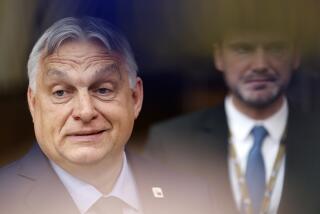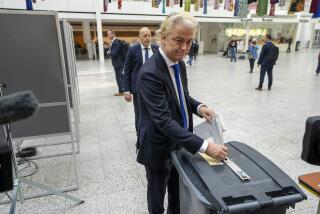EU Will Discuss Sharing Power
- Share via
BERLIN — On the heels of a weekend debate among foreign ministers about what rights should be granted new members of the European Union, the continent’s center-left leaders will be huddling here today and Tuesday to ponder how to keep peace and share power in their growing family.
Mindful of the deep divisions already evident among the 15 EU member states in their visions of the future Europe, leaders of the center-left parties in power in most of those states want to brainstorm ideas for managing the alliance if, as expected, it swells to 27 members over the next decade.
The on-and-off dialogue over the emerging federal Europe got another kick-start last week after German Chancellor Gerhard Schroeder called for strengthening the EU’s executive and legislative institutions and allowing alliance citizens to directly elect a federal president.
No watershed decisions or even a consensus are expected from this week’s shop talk, especially in the absence of British Prime Minister Tony Blair, who begged off--reportedly to announce a date next month for British elections. He is sending Foreign Secretary Robin Cook in his stead.
But the gathering of leftist party leaders, many of whom are also heads of government in the EU’s most influential states, is likely to advance the German concept of the continent’s future, which has been gaining ground through repetition and the host country’s growing readiness to wield a clout commensurate with its size and economic importance.
With 82 million citizens, Germany is the largest EU state in terms of population, and it generates 24% of the collective gross domestic product of the alliance. It contributes an even greater share to the EU budget, bankrolling 26% of the subsidies and development schemes that benefit mostly the poorer members.
France has long played the lead role in shaping a united Europe and delineating its powers, since Germans humbled by the Third Reich’s atrocities were careful to avoid any moves that looked like fresh attempts at domination.
Today, however, Germany is governed by people such as Schroeder, 57, who have no personal memories of the Nazi era and feel less guilt about the Holocaust than did the previous generation of leaders. Reunified and reinvigorated after four decades of division, the country is newly assertive in giving voice to its views about how best to run Europe.
In little more than a year, three blueprints for a so-called United States of Europe have been drafted here and dangled before the drafters’ European colleagues. All three proposals--from Foreign Minister Joschka Fischer, President Johannes Rau and now Schroeder--have elicited dismissive responses from some of those colleagues but also incremental acceptance of Germany’s taking the lead in running Europe by virtue of its size.
Last week’s suggestions by Schroeder were rejected by France’s minister for European affairs, Pierre Moscovici, as outside the mainstream of alliance thinking. In Denmark, Claus Larsen-Jensen of the governing Social Democrats likewise deemed the push for more federal power “a wrong step.” But Italy has welcomed the plan, and Belgian Prime Minister Guy Verhofstadt, whose country will take over the EU presidency from Sweden in July, praised the German chancellor’s ideas for their promise of making EU government more open and democratic.
Schroeder unveiled his strategy in the shape of a working paper within the Social Democratic Party he heads, not as leader of Germany. It was seen as at least partly motivated by a need to appease his own people, who are fearful of swapping their trusted currency, the mark, for the new EU currency, the euro, next year. Germans are also worried that EU expansion will put even more pressure on their job market, now plagued by more than 9% unemployment, and that a still-larger chunk of their tax revenues will have to go to the alliance budget to pay for reform and reconstruction in Eastern Europe.
The German proposals for a federal Europe, which have received support across party lines within this country, are molded in the national image. Germany’s 16 states enjoy broad autonomy, with their own constitutions, parliaments and responsibility for all issues not specifically ceded to the federal government. Schroeder wants the European Parliament augmented by a second chamber that would be made up of appointed deputies from each member state.
Eastward expansion to include countries spun free of the Communist orbit--among them Poland, Hungary, Estonia and the Czech Republic--also will shift the continent’s center of gravity to Germany, which has invested more in the newly democratized states and has championed their desire to join the powerful EU.
In part, Germany’s embrace of the expansion issue is due to self-interest. Its front-line position and prosperous economy make an enticing destination for the nearly 4 million people expected to migrate westward over the next 30 years once workers from the eastern countries, which all suffer from high unemployment, are free to take jobs anywhere within the EU.
Germany and Austria, the EU nations directly positioned to take the brunt of an onslaught by jobless Easterners, used the weekend forum to push for at least a seven-year transition period between new membership in the alliance and the right of a new member’s citizens to take jobs in preexisting EU countries.
More to Read
Sign up for Essential California
The most important California stories and recommendations in your inbox every morning.
You may occasionally receive promotional content from the Los Angeles Times.











